- About us»
- Net income calculator»
- Population aging»
-
-
- Unemployment structure in the Visegrad region
- Development in least developed regions
- Statistics of the least developed regions in Slovakia
- Detailed statistics of least developed regions in Slovakia
-
- Average wage
- Material need benefits
- Meal allowance
- Counties of Slovakia
- Inflation
- Living and Subsistence Minimum
- Unemployment of Czechia and Slovakia
- NACE Classification
-
- Life expectancy
- Gender differences
- Youth unemployment and NEET
- Minimum wage in EU
- Unemployment rates of different age groups
- Share of salaries on GDP
- Long term unemployment
- Unemployment rate
- Percentage of employees ususally working at nights
- Employment rate
- NEET
-
- Bratislava and surroundings
- Kopanice
- Danube river
- lower Vah river
- middle Vár river
- upper Nitra river
- lower Nitra river
- Mining cities
- Kysuce a Orava
- upper Vah river - Liptov
- Spiš cities
- upper Hron river
- Juhoslovenská kotlina
- Košice fold and Torysa river
- upper Zemplín
- lower Zemplín
- EU regions
- NUTS3 regions of Slovakia
- LAU1 dataset
-
-
- Projects and activities
- Inclusive growth»
- Good work
- Project SKRS
- Social system – reality and vision
-
- Education of unemployed
- Young unemployed not taking part in education
- Proposal to change the system of education funding
- Library
- News»
- Contact
Lombardy – ITC4
EU regions: Italy > Northwest Italy > Lombardy
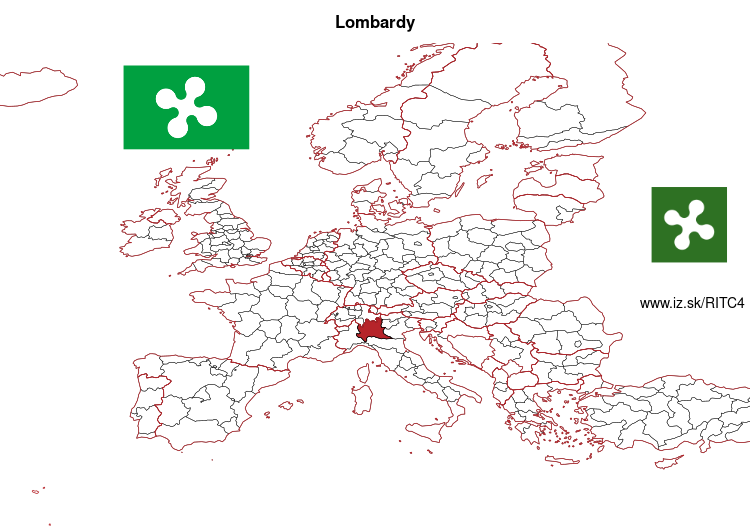
| Indicator | Period | Value |
|---|---|---|
| Life long learning | ||
| life long learning participation | 2024 | 12 |
| Part time jobs and flexible employment | ||
| percentage of part time workers | 2024 | 15.57 |
| percentage of part time workers, men | 2024 | 5.37 |
| percentage of part time workers, women | 2024 | 28.37 |
| Gender differences | ||
| gender gap in employment rate | 2024 | 81.65 |
| gender gap in unemployment rate | 2024 | 134.38 |
| Graduates and young people | ||
| unemployment rate of youth with elementary education | 2024 | 15.8 |
| NEET | 2024 | 8.9 |
| Gross domestic product | ||
| GDP per capita in PPS of EU average | 2023 | 134 |
| Employment | ||
| employment rate | 2024 | 69.4 |
| Social exclusion | ||
| people at risk of poverty or social exclusion | 2020 | 16.1 |
Lombardy slovensky: ITC4
Subregions: Province of Varese, Province of Como, Province of Lecco, Province of Sondrio, Province of Bergamo, Province of Brescia, Province of Pavia, Province of Lodi, Province of Cremona, Province of Mantua, Metropolitan City of Milan, Province of Monza and Brianza
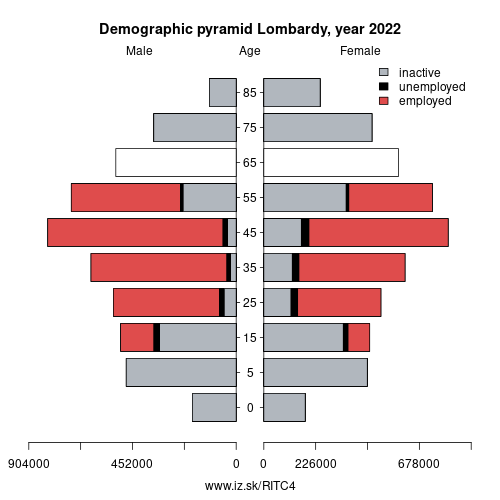
Unemployment
| Indicator | Period | Value |
|---|---|---|
| Unemployment | ||
| unemployment rate | 2024 | 3.7 |
| youth unemployment rate | 2024 | 12.7 |
| Long term unemployment | ||
| long term unemployment | 2024 | 1.3 |
| share of long term unemployed | 2024 | 36.1 |
Demographics
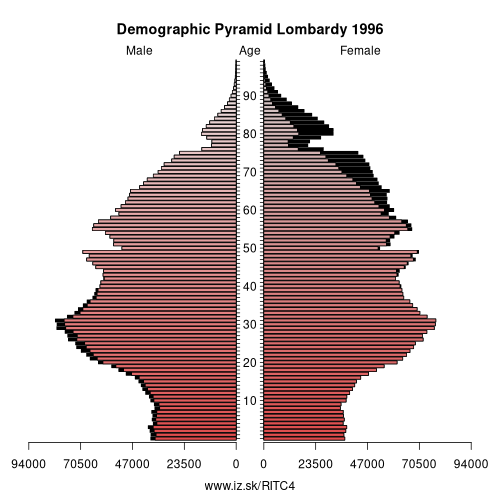
| Indicator | Period | Value |
|---|---|---|
| Demographics | ||
| number of inhabitants | 2025 | 10 033 918 |
| population density | 2023 | 433.6 |
| old-age dependency ratio | 2025 | 37.3 |
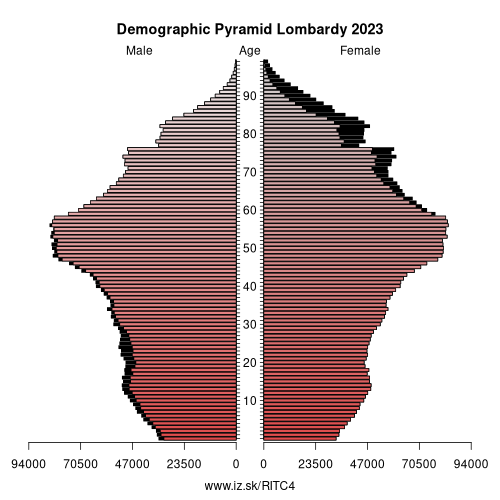
Employment by sectors, Lombardy
| NACE r2 | % | NACE r2 | % | ||
|---|---|---|---|---|---|
| A | 56.1 | 1% | B-E | 1121 | 25% |
| F | 272.8 | 6% | G-I | 1055.3 | 23% |
| J | 195.2 | 4% | K | 170.7 | 4% |
| L | 34.6 | 1% | M_N | 578.5 | 13% |
| O-Q | 726.7 | 16% | R-U | 327.1 | 7% |
| TOTAL | 4537.8 | 100% |
Data for the period year 2024. Source of the data is Eurostat, table [lfst_r_lfe2en2].
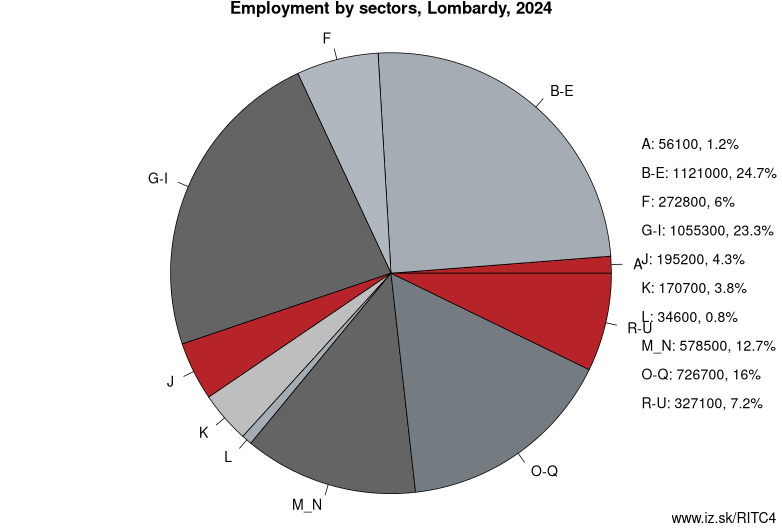
From Wikipedia :
Lombardy ( LOM-bər-dee, LUM-; Italian: Lombardia [lombarˈdiːa]; Lombard: Lombardia, Western Lombard: [lũbarˈdiːa], or Lombardéa, Eastern Lombard: [lombarˈde.a]) is one of the twenty administrative regions of Italy, in the northwest of the country, with an area of 23,844 square kilometres (9,206 sq mi). About 10 million people, forming one-sixth of Italy's population, live in Lombardy and about a fifth of Italy's GDP is produced in the region, making it the most populous and richest region in the country and one of the richest regions in Europe. Milan, Lombardy's capital, is the second-largest city and the largest metropolitan area in Italy.Etymology
The word Lombardy comes from Lombard, which in turn is derived from Late Latin Longobardus, Langobardus ("a Lombard"), derived from the Proto-Germanic elements *langaz + *bardaz; equivalent to long beard. Some sources derive the second element instead from Proto-Germanic *bardǭ, *barduz ("axe"), related to German Barte ("axe").
During the early Middle Ages „Lombardy" referred to the Kingdom of the Lombards (Latin: Regnum Langobardorum), a kingdom ruled by the Germanic Lombards who had controlled most of Italy since their invasion of Byzantine Italy in 568. As such „Lombardy" and „Italy" were almost interchangeable; by the mid-8th century the Lombards ruled everywhere except the Papal possessions around Rome (roughly modern Lazio and northern Umbria), Venice and some Byzantine possessions in the south (southern Apulia and Calabria; some coastal settlements including Amalfi, Gaeta, Naples and Sorrento; Sicily and Sardinia). The Kingdom was divided between Longobardia Major in the north and Langobardia Minor in the south, which were until the 8th century separated by the Byzantine Exarchate of Ravenna (roughly Romagna and northern Marche, and initially also Emilia and Liguria) and the Papacy (which was initially part of the Exarchate). During the late Middle Ages, after the fall of the northern part of the Kingdom to Charlemagne, the term shifted to mean Northern Italy. (See: Kingdom of Italy (Holy Roman Empire)). The term was also used until around 965 in the form Λογγοβαρδία (Longobardia) as the name for the territory roughly covering modern Apulia which the Byzantines had recovered from the Lombard rump Duchy of Benevento.
Other: Northwest Italy, Piedmont, Aosta Valley, Lombardy, Liguria
Neighbours: South Tyrol, Emilia-Romagna, Veneto, Trentino-South Tyrol, Canton of Ticino, Piedmont, Eastern Switzerland
Subregions: Province of Varese, Province of Como, Province of Lecco, Province of Sondrio, Province of Bergamo, Province of Brescia, Province of Pavia, Province of Lodi, Province of Cremona, Province of Mantua, Metropolitan City of Milan, Province of Monza and Brianza
Suggested citation: Michal Páleník: Europe and its regions in numbers - Lombardy – ITC4, IZ Bratislava, retrieved from: https://www.iz.sk/PITC4, ISBN: 978-80-970204-9-1, DOI:10.5281/zenodo.10200164

 Share
Share Facebook
Facebook Twitter
Twitter News
News